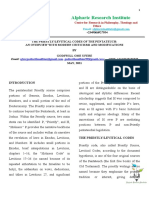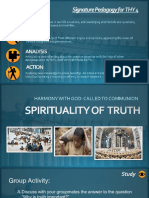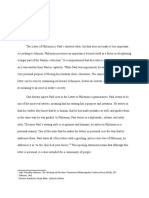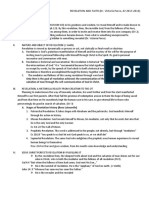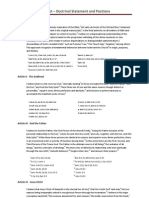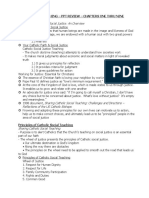0%(1)0% found this document useful (1 vote)
137 viewsSpirituality of Mercy
Spirituality of Mercy
Uploaded by
Levitha Villar1. Mercy expresses a motherly relation of love, tenderness, and compassion. It indicates gratitude for unmerited gifts from God.
2. The document discusses the "throw-away culture" which treats people as disposable and focuses on consumption and maximization over care and compassion.
3. The spirituality of mercy serves as an antidote by embracing care for all people and creation, promoting integral relationships over disposability.
Copyright:
© All Rights Reserved
Available Formats
Download as PDF, TXT or read online from Scribd
Spirituality of Mercy
Spirituality of Mercy
Uploaded by
Levitha Villar0%(1)0% found this document useful (1 vote)
137 views3 pages1. Mercy expresses a motherly relation of love, tenderness, and compassion. It indicates gratitude for unmerited gifts from God.
2. The document discusses the "throw-away culture" which treats people as disposable and focuses on consumption and maximization over care and compassion.
3. The spirituality of mercy serves as an antidote by embracing care for all people and creation, promoting integral relationships over disposability.
Copyright
© © All Rights Reserved
Available Formats
PDF, TXT or read online from Scribd
Share this document
Did you find this document useful?
Is this content inappropriate?
1. Mercy expresses a motherly relation of love, tenderness, and compassion. It indicates gratitude for unmerited gifts from God.
2. The document discusses the "throw-away culture" which treats people as disposable and focuses on consumption and maximization over care and compassion.
3. The spirituality of mercy serves as an antidote by embracing care for all people and creation, promoting integral relationships over disposability.
Copyright:
© All Rights Reserved
Available Formats
Download as PDF, TXT or read online from Scribd
Download as pdf or txt
0%(1)0% found this document useful (1 vote)
137 views3 pagesSpirituality of Mercy
Spirituality of Mercy
Uploaded by
Levitha Villar1. Mercy expresses a motherly relation of love, tenderness, and compassion. It indicates gratitude for unmerited gifts from God.
2. The document discusses the "throw-away culture" which treats people as disposable and focuses on consumption and maximization over care and compassion.
3. The spirituality of mercy serves as an antidote by embracing care for all people and creation, promoting integral relationships over disposability.
Copyright:
© All Rights Reserved
Available Formats
Download as PDF, TXT or read online from Scribd
Download as pdf or txt
You are on page 1of 3
THY 4 • Mercy as contemplated is said to be a
virtue influencing one's will to have
Harmony with God: Called to
compassion for, and, if possible, to
Communion A. Spirituality of Mercy
alleviate another's misfortune.
• It is the teaching of St. Thomas Aquinas
that although mercy is as it were the
How should we understand mercy?
spontaneous product of charity, yet it is to
• In Hebrew and Biblical language, the seat be reckoned a special virtue adequately
of emotion is not only the heart but the distinguishable from this latter. In fact the
viscera, in Hebrew the rachamim, which Scholastics in cataloguing it consider it to
in the Bible means misericordia/mercy. be referable to the quality of justice
This term rachamim is related to the mainly because, like justice, it controls
noun rechem, which is the womb. relations between distinct persons.
• Mercy expresses therefore a typical
feminine and motherly relation of love
and tenderness, which gives the sense of • The spirituality of mercy lives both the
security and warmth. To talk of God’s corporal and spiritual actions of mercy.
mercy means therefore that God is like a • These are actions that bring God’s mercy
mother, who takes care of her children, to our neighbor especially the poor and
who loves them, never can forget them, the oppressed, all those who are
suffers with them when they are suffering suffering.
and whose house and table is always
open for them (Sal 27,10).
THE WORKS OF MERCY
Corporal Spiritual
Feed the Hungry Instruct the Ignorant
• Mercy indicates in the direction of Give drink to the Counsel the Doubtful
gratitude for an unmerited gift and thirsty
unmerited grace, in the Hebrew language Shelter the Homeless Admonish the Sinners
hesed, which in the Bible also can be Clothed the Naked Forgive offenses
used for what in English means mercy. Visit the Sick Comfort the afflicted
Visit the Imprisoned Bear wrongs patiently
Bury the Dead Pray for the living and the
• In the Beatitudes of the Sermon on the dead
Mount he called happy the gentle, the
merciful, the peacemakers, not the
• As followers of Christ mercy is indeed
persecutors but those who are persecuted
our vocation.
(Matt 5,1-11).
• It therefore includes the natural world and
MERCY IS ALSO LOVING OUR is not merely extended to it but embraces
ENEMIES EVEN IF THEY PERSECUTE God’s creation—the environment and
US non-human creatures.
Spirituality of Mercy: Addressing the and breaks, exploits and squeezes to the
Throw-Away Culture last drop. Then, goodbye.
• Evangelium Gaudium (EG no.53)
- Fellow Human beings
Indicators of Throw-away Culture
• Laudato Si (LS 123)
- Fellow human beings especially the Pope Francis in his Apostolic Exhortation
poor Evangelii Gaudium (2013), in his Encyclical
• LA no.21 and 22 Laudato Si’ (2015), and in his Post-Synodal
- With nature/environment/our planet Apostolic Exhortation on love in the family
Amoris Laetitia: (2016) describe the prevailing
culture that destroys life of both the present
Crisis of “Throw-away Culture” and future generations:
(Hedonism) a. wasting of our resources fueled by
consumerism and the market economy,
What is the crisis of “throw-away culture”
b. the practice of contraception and
and its Hedonistic tendencies?
abortion, abandonment of the elderly
Spirituality of Mercy: Addressing the and the handicapped,
Throw-Away Culture c. exclusion of the poor, exploitation of
the weak, and
- Human beings are themselves considered d. discarding of genuine relationships, of
consumer goods to be used and then married love and marriage vows.
discarded. We have created a “throw
away” culture which is now spreading. It
is no longer simply about exploitation How does the ‘spirituality of mercy’ serve as
and oppression, but something new. . antidote to the double degradation brought
.The excluded are not the “exploited” about by the throw-away culture?
but the outcast, the “leftovers”.(EG53)
As followers of Christ mercy is indeed our
vocation.
• Narcissism makes people incapable of Correspondingly, the spirituality of mercy
looking beyond themselves, beyond that is truly faithful to God’s call is holistic:
their own desires and needs....adults
who seek a kind of “independence” and • Integral – everything is connected
reject the ideal of growing old together,
It therefore includes the natural world and is
looking ager and supporting one another.
not merely extended to it but embraces
God’s creation—the environment and non-
human creatures.
• We treat affective relationships the way
we treat material objects and the This spirituality is integral, holistic and
environment: everything is disposable; harmonious, for it recognizes its kinship
everyone uses and throws away, takes with the rest of God’s creatures, the rest of
God’s creation.
Sawa vs. Awa people; they are our brothers and sisters
who, with us, are called to build a “city
Throw-Away Culture of Mercy
which is reliable”.
Culture (Sawa) (Awa)
Objectification Contemplation The social character of mercy demands that
Consumption Compassion we not simply stand by and do nothing. It
Maximization Care requires us to banish indifference and
Disposal Communion hypocrisy
Living “The Primacy of Mercy” (MV 17,
MetM 1) • Pope John XXIII, at the opening of the
Second Vatican Council said that the
a. “Culture of care” as antidote to the church must use the medicine of mercy.
double degradation brought about by The Church must therefore “proclaim the
the throwaway culture (EG 193, LS mercy of God, provide people with God’s
231, AL 191) mercy and must allow God’s mercy to
• Laudato Si’ mentioned the word “care” 35 appear and be realized in its entire life.
times, while “stewardship” only twice. The
subtitle of Laudato Si is in fact on “care for
our common home”. From “stewardship” What is the Spirituality of Mercy?
we notice a shift to “care”. Hence, there is
• A spirituality of mercy is a Spirit-filled
a shift from duty-based ethics to a virtue
movement of the heart “to be merciful
based ethics of “care.”
just as God our Heavenly Father is
merciful” (Lk 6:36). This spirituality
arises from our own experience of God’s
“To hear both the cry of the earth and the mercy.
cry of the poor” (LS 49). • The spirituality of mercy lives both the
We can truly hear them and attend to them if corporal and spiritual actions of mercy.
we have Mercy • It becomes a deep spiritual experience
when forgiveness and reconciliation are
• A spirituality of mercy is a Spirit-filled offered toward our enemies—those who
movement of the heart “to be merciful have wronged us, had caused us pain,
just as God our Heavenly Father is anguish, humiliation…misery.
merciful” (Lk 6:36). This spirituality • These are actions that bring God’s mercy
arises from our own experience of God’s to our neighbor especially the poor and
mercy. the oppressed, all those who are
suffering.
“Unleashing the creativity of mercy
(MetM 18-19)
Mercy impels us to roll up our sleeves and
set about restoring dignity to millions of
You might also like
- Mission Report 01Document3 pagesMission Report 01Mario CarneiroNo ratings yet
- 2 - Spirituality of TruthDocument35 pages2 - Spirituality of TruthpamelaNo ratings yet
- (A) .I. Laity in The Church Identity and Mission in IndiaDocument16 pages(A) .I. Laity in The Church Identity and Mission in IndiaPhiloBen KoshyNo ratings yet
- 9 - Christus VivitDocument54 pages9 - Christus VivitHannah PabalanNo ratings yet
- Christian UnityDocument13 pagesChristian UnitySishaj P SimonNo ratings yet
- A Time of HarvestDocument4 pagesA Time of Harveststephen arañaNo ratings yet
- 5 - Interpretation of ScripturesDocument29 pages5 - Interpretation of ScripturesmargarettebeltranNo ratings yet
- The Priestly/Levitical Codes of The PentateuchDocument14 pagesThe Priestly/Levitical Codes of The PentateuchGodswill M. O. UfereNo ratings yet
- A Theology of Discipleship in AsiaDocument12 pagesA Theology of Discipleship in AsiaAlex MillerNo ratings yet
- Burial of Jesus PDFDocument5 pagesBurial of Jesus PDFromuloNo ratings yet
- 1.1. Spirituality of TruthDocument37 pages1.1. Spirituality of TruthRafael Dela ConchaNo ratings yet
- Biblical Story of CreationDocument5 pagesBiblical Story of CreationBea Valencia100% (1)
- Exegetical Essay - Part 3Document7 pagesExegetical Essay - Part 3api-583124304No ratings yet
- The Baptist College of FloridaDocument7 pagesThe Baptist College of FloridaLauren Michelle ForrestNo ratings yet
- Notes - History of Christian MissionDocument4 pagesNotes - History of Christian MissionamranNo ratings yet
- "Post-Exilic Prophets": by Eileen SchullerDocument10 pages"Post-Exilic Prophets": by Eileen SchullerGinoSDBNo ratings yet
- Christian Youth MovementDocument8 pagesChristian Youth MovementLalrinpuia RalteNo ratings yet
- Introduction To MissiologyDocument6 pagesIntroduction To Missiologymarvan_dNo ratings yet
- 66 RevelationDocument785 pages66 RevelationlauelishaNo ratings yet
- Ministry With AbusedDocument24 pagesMinistry With Abusedapi-284928799No ratings yet
- HermeneuticsDocument13 pagesHermeneuticsAmadaLibertadNo ratings yet
- An Examination of Karl MarxDocument6 pagesAn Examination of Karl MarxNdubuisi EmmanuelNo ratings yet
- Malawi MondayDocument7 pagesMalawi MondayDavid MazaNo ratings yet
- A Divine Revelation of The Spirit RealmDocument19 pagesA Divine Revelation of The Spirit Realmadebayo testimonyNo ratings yet
- Auxiliaries in MinistryDocument161 pagesAuxiliaries in Ministryapi-237951483No ratings yet
- The Danger of Rejecting The GospelDocument4 pagesThe Danger of Rejecting The GospelGrace Church ModestoNo ratings yet
- Thesis 1: GALLETIS, Razil S. (46 Gen) REVELATION AND FAITH (Dr. Victoria Parco, AY 2013-2014)Document21 pagesThesis 1: GALLETIS, Razil S. (46 Gen) REVELATION AND FAITH (Dr. Victoria Parco, AY 2013-2014)Crisanta MartinezNo ratings yet
- Brief Study of Paul's Theology of LoveDocument11 pagesBrief Study of Paul's Theology of Lovesenghpung24No ratings yet
- Early Church FathersDocument5 pagesEarly Church Fathersmarkchunga78No ratings yet
- CHRISTIAN ETHICS AS A DISCIPLINE (Reading Material)Document7 pagesCHRISTIAN ETHICS AS A DISCIPLINE (Reading Material)Adam Lawrence TolentinoNo ratings yet
- Patterns of Ministry in The BibleDocument6 pagesPatterns of Ministry in The BibleEverything newNo ratings yet
- (NT3) Salvation in Luke-ActsDocument5 pages(NT3) Salvation in Luke-ActsparliamentNo ratings yet
- Jim Peet Doctrinal StatementDocument7 pagesJim Peet Doctrinal StatementJames R PeetNo ratings yet
- 57 Articles On Biblical Basis of MissionsDocument194 pages57 Articles On Biblical Basis of MissionsNurul-Haque100% (2)
- Catholic Social Teaching - PPT Review - Chapters One Thru Nine Chapter OneDocument15 pagesCatholic Social Teaching - PPT Review - Chapters One Thru Nine Chapter OneEFGNo ratings yet
- Ecclesiology Lecture 1Document22 pagesEcclesiology Lecture 1Alexander Rubio100% (1)
- False TeachingDocument2 pagesFalse TeachingRODNEY TAN100% (1)
- International Theological CommissionDocument40 pagesInternational Theological CommissionJBSfanNo ratings yet
- Images of The ChurchDocument9 pagesImages of The ChurchFlorence Delector100% (1)
- A Biblical Understanding of Fivefold Ministry: Mag. Claudia R. WintochDocument7 pagesA Biblical Understanding of Fivefold Ministry: Mag. Claudia R. WintochkwameNo ratings yet
- The Christian Vision of The Person and SocietyDocument8 pagesThe Christian Vision of The Person and SocietyLeonardo BritoNo ratings yet
- Questions/Comments E-MailDocument6 pagesQuestions/Comments E-MailArchie Gabuyo Jr.No ratings yet
- FA - Steps To Freedom - REV 8-2019Document86 pagesFA - Steps To Freedom - REV 8-2019Joseph Maina.No ratings yet
- Week 1 Origin of The Bible and Its BackgroundDocument49 pagesWeek 1 Origin of The Bible and Its BackgroundColeen BalaccuaNo ratings yet
- Office of PastorDocument3 pagesOffice of Pastorvmcchurch100% (1)
- The Triumph of The ResurrectionDocument11 pagesThe Triumph of The ResurrectionsekarjoshuaNo ratings yet
- Towards A Philosophy of Church ManagemenDocument8 pagesTowards A Philosophy of Church ManagemenIntanNo ratings yet
- Book Reflection "Gospel Wakefulness" by Jared WilsonDocument2 pagesBook Reflection "Gospel Wakefulness" by Jared WilsonMatthew HundleyNo ratings yet
- The Practice of The Healing Ministry TodayDocument11 pagesThe Practice of The Healing Ministry TodaylovelyryNo ratings yet
- What Are The Names and Titles of The Holy SpiritDocument2 pagesWhat Are The Names and Titles of The Holy Spiritnigel100% (2)
- Pauline Mission and Missionary Journeys and Missionary StrategiesDocument22 pagesPauline Mission and Missionary Journeys and Missionary Strategiesbenji69911060No ratings yet
- The Promised Messiah and The Miraculous Birth Leader's GuideDocument6 pagesThe Promised Messiah and The Miraculous Birth Leader's GuideAndevie Balili Iguana100% (1)
- Paper PresentationDocument7 pagesPaper PresentationDuan GonmeiNo ratings yet
- Deacons: Servants of The ChurchDocument6 pagesDeacons: Servants of The ChurchGrace Church ModestoNo ratings yet
- Daoism and EvangelismDocument14 pagesDaoism and Evangelismwesterry67% (3)
- 2022 11 20 My Mind Part 6 Overcoming Negative Thoughts and Emotions Ps Ashish RaichurDocument16 pages2022 11 20 My Mind Part 6 Overcoming Negative Thoughts and Emotions Ps Ashish RaichurapcwoNo ratings yet
- Malachi - Writing AssignmentDocument8 pagesMalachi - Writing AssignmentrbenhurNo ratings yet
- Elements of The Priests Life and HolinessDocument5 pagesElements of The Priests Life and Holinessronel bayonon100% (1)
- Rediscover JesusDocument2 pagesRediscover JesuskevinNo ratings yet
- UnionwithchristDocument13 pagesUnionwithchristpavlovggNo ratings yet
- Leisure The Basis of Culture Josef Pieper Gerald Malsbary Roger ScrutonDocument183 pagesLeisure The Basis of Culture Josef Pieper Gerald Malsbary Roger ScrutonMark Zlomislic100% (2)
- Islamic Studies NotesDocument20 pagesIslamic Studies NotesanisNo ratings yet
- Recollection 1 Day Pamukaw 1 To 7 SkedDocument3 pagesRecollection 1 Day Pamukaw 1 To 7 SkeddrbasyNo ratings yet
- Let No One Despise Your YouthDocument4 pagesLet No One Despise Your YouthJames MemanaNo ratings yet
- He Hears Us-Prayer To God - SERMONDocument4 pagesHe Hears Us-Prayer To God - SERMONKim JohnNo ratings yet
- SFC Evangelization Training v2024Document12 pagesSFC Evangelization Training v2024ecacorporation58No ratings yet
- Can't Stop Singing DDocument2 pagesCan't Stop Singing DCrom GarNo ratings yet
- Cosmic Salvation and Contextual Theologies SandeshDocument9 pagesCosmic Salvation and Contextual Theologies SandeshJoeNo ratings yet
- Allan Ritch - Chapter Assignment 1 - BIBL 350-B03 LUODocument7 pagesAllan Ritch - Chapter Assignment 1 - BIBL 350-B03 LUOAllan Ritch100% (2)
- Christ's Radiant Light. Peter Demetris.Document5 pagesChrist's Radiant Light. Peter Demetris.ralph_knowlesNo ratings yet
- James Series Sermon Notes WK 2 Sun Aug 19 2012Document8 pagesJames Series Sermon Notes WK 2 Sun Aug 19 2012Tepa FaletoeseNo ratings yet
- W04 Writing Practice: Body Paragraph: InstructionsDocument2 pagesW04 Writing Practice: Body Paragraph: InstructionsArturo Gabriel CristecheNo ratings yet
- Morning RevivalDocument254 pagesMorning RevivalassdsadsasdsadaNo ratings yet
- Nilai Ijazah 2024Document42 pagesNilai Ijazah 2024idaroyanisyhNo ratings yet
- The Gift of TeachingDocument17 pagesThe Gift of Teachingrd100% (1)
- 01 Now Faith Is - NotesDocument6 pages01 Now Faith Is - NotesRamon MaralitNo ratings yet
- The Power of God - PDF - A W PinkDocument18 pagesThe Power of God - PDF - A W PinkEzeokoliChukwuebukaSamuelNo ratings yet
- Asad - 2002 - The Construction of Religion As An Anthropological CategoryDocument20 pagesAsad - 2002 - The Construction of Religion As An Anthropological Categorymar-23423No ratings yet
- THEO 103 Course Framework 2Document13 pagesTHEO 103 Course Framework 2LSNo ratings yet
- Is Jesus Christ More Than One Person?Document4 pagesIs Jesus Christ More Than One Person?JC NazarenoNo ratings yet
- The Witch and The False Prophet: Jessie Penn-Lewis and Charles FinneyDocument20 pagesThe Witch and The False Prophet: Jessie Penn-Lewis and Charles FinneyA.J.100% (6)
- God's WarningsDocument50 pagesGod's Warnings71danielaNo ratings yet
- F. Kerr - Rebels With A Cause. 20th Century Roman Catholic TheologiansDocument9 pagesF. Kerr - Rebels With A Cause. 20th Century Roman Catholic TheologiansdaPipernoNo ratings yet
- Be A Diligent Seeker.Document3 pagesBe A Diligent Seeker.CLOVIS J. MBEUKANo ratings yet
- Orphan - Son Paradigm - For EvangelistsDocument3 pagesOrphan - Son Paradigm - For EvangelistsVictor MasihNo ratings yet
- When Did Modern Science BeginDocument10 pagesWhen Did Modern Science Beginshravani.kelkarNo ratings yet
- A Christian Philosophy of ManDocument6 pagesA Christian Philosophy of Mangenelyn91% (11)
- CLVE 8 MODULE 4 FinalDocument8 pagesCLVE 8 MODULE 4 FinalSr. Mary Ethel DespacioNo ratings yet







